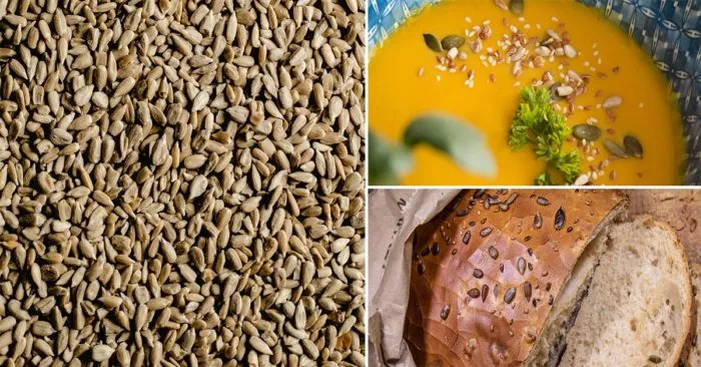Table of Contents
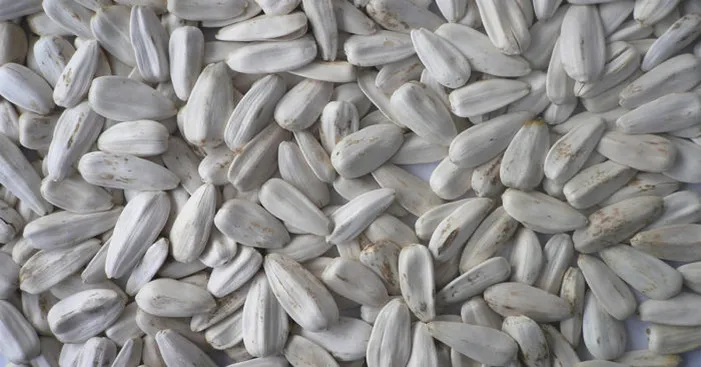
For hundreds of years, people around the world enjoyed black or white sunflowers because of their nutty addictive flavor.
Welcome to the world of white sunflowers seeds! White sunflowers are an incredibly unique and beautiful variety of the traditional black variety.
These white sunflowers seeds are also incredibly nutritious and a great source of essential vitamins and minerals.
In this blog post, we’ll delve into the many benefits of white sunflower seeds and how you can incorporate them into your diet.
Sunflower seeds: overview
Compared to other types of seeds and nuts, sunflower seeds are known for their tiny size and ease of consumption.
The cultivation of sunflower seeds is spread across the world with Ukraine and Russia as the top producers. (1)
In recent years, the USA started growing sunflowers mainly in North and South Dakota. (2)
Fast forward nowadays, the USA became the 10th largest producer of these delicious seeds.
You can find these seeds all around the year, however, they have many different names including, sunflower seeds, love of the sun, moon flowers.
The uses of this little seed vary from baking and pastries to being consumed (roasted) for entertainment, especially in the Middle East.
Also, it is an ingredient in many healthy foods and energy drinks due to its high content in vitamins and minerals.
But first…
What are white sunflowers?
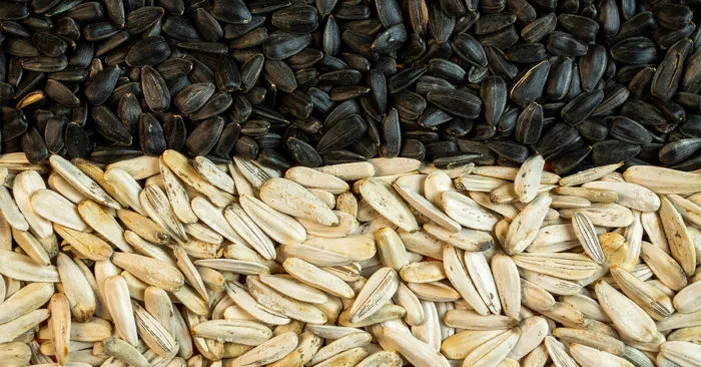
People call these flowers after the sun, because they are yellow/white flowers that turn towards the sun throughout the day. (3)
The seeds grow inside the flower, which can reach 1 foot in diameter and contain more than 2000 seeds. (4)
The colors of these flowers can be yellow, orange, red and even white!
As for the common types, we can mention the two main types: the ones grown to produce seeds and others grown for oil.
The edible sunflower seeds are usually either black, white & black striped, or white.
As for those grown for oil production, they usually contain smaller seeds covered in a black hull.
In today’s version, the white type is grown mostly in Turkey which is why some people call them “Turkish sunflower seeds”. (5)
They have a longer shell, with a bigger inside the seed that is similar to the taste of regular striped or black sunflower seeds.
Black or white sunflowers are usually roasted to enhance their nutty flavor, although you can also find them raw.
White sunflowers seeds nutritional values and health benefits:
Nutritional values:
White sunflowers seeds can be consumed cooked or raw, dried or roasted, on their own or as an ingredient in a recipe.
No matter how you eat them, their nutritional values and health benefits are a great asset to your body.
These are the nutritional data of 1oz (28g) of raw white sunflower seeds: (6)
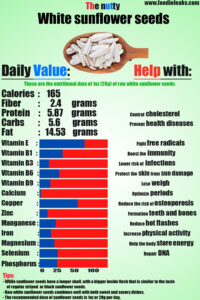
- Calories: 165
- Fiber: 2.4g
- Protein: 5.87g
- Carbs: 5.6g
- Fat: 14.53g
- E vitamin: 66%
- B1 vitamin: 34.74%
- B3 vitamin: 14.7%
- B6 vitamin: 29%
- B9 vitamin: 16%
- Calcium: 2%
- Copper: 56.5%
- Zinc: 12.7%
- Manganese: 24%
- Iron: 17.8%
- Magnesium: 22.88%
- Selenium: 27.11%
- Phosphorus: 26.55%
Health benefits:
Now let’s take a look at some of the health benefits you get from white sunflowers seeds:
Control cholesterol:
They are a good source of phytosterols, plant sterols that prevent the body from absorbing cholesterol. (7)
Just two tablespoons of white sunflower seeds contain 70mg and that is almost 20% of your daily need in phytosterols.
Also, they contain monounsaturated fatty acids which give the body the ability to control cholesterol and prevent heart diseases.
Improve the overall immunity:
Vitamin E, found abundantly in sunflower seeds, has antioxidant properties which help fight free radicals.
As a result, there is a lower risk of infections and the immune system can work under better conditions. (8)
In fact, just 1tbsp of white sunflower seeds provides your body with over 19% of its daily needs in vitamin E.
This same vitamin E is a great alternative treatment for infections and lung-related diseases such as colds or coughs. (9)
May help reduces weight:
As a nutrient-rich food, white sunflowers seeds can be a great snack to reduce a few extra pounds.
Indeed, they are full of dietary fibers which lower the feeling of hunger and creates a feeling of fullness. (10)
A good source of estrogens:
White sunflowers seeds contain phytoestrogens which offer many health benefits.
Among the virtues that phytoestrogens offer we mention: (11)
- Optimize menstrual periods.
- Promotes heart health.
- Reduce the risk of osteoporosis.
- Relieve hot flashes.
Rich in Phosphorus:
One of the abundant minerals of white sunflowers seeds is Phosphorus with over 7% of the daily need in just 1tbsp.
This mineral is essential for many body functions including the formation of teeth, bones, cell membranes, and DNA. (12)
Phosphorus also helps produce and store energy in the body which allows us better physical activity.
Reduce risks of cancer:
In addition to the antioxidant properties of vitamin E, white sunflowers seeds are a great source of Selenium as well.
Selenium is a beneficial mineral that also has antioxidant properties and exists abundantly in sunflower seeds.
This mineral can repair and build DNA in damaged cells, preventing the spread of cancerous cells. (13)
Just 1tbsp of white sunflowers seeds contain over 15% of our daily needs in Selenium.
Improve skin health:
The antioxidant properties of white sunflowers seeds help them fight free radicals which are the root of many health issues.
Among those issues, toxins are responsible for skin problems such as pimples.
Once you consume white sunflowers seeds moderately you will help protect your skin from sun damage. (14)
Many dermatologists also recommend the use of sunflower sunscreen lotions.
How many white sunflowers seeds should I eat per day?
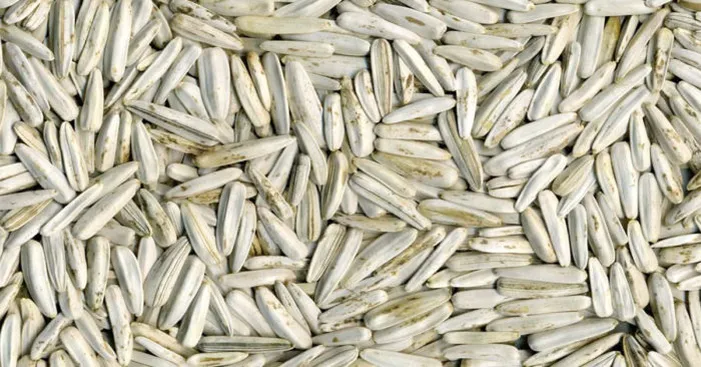
To begin with, there is no contraindication to consume white sunflower seeds in a reasonable way.
Just like mentioned earlier, these seeds are full of fats and high in calories so a reasonable amount would be:
A tablespoon or a handful per day is enough to provide all the nutrients of white sunflower seeds within a balanced diet.
Some would say just a handful is not enough, and others would think it’s too much, but remember:
“In a balanced diet, it is the whole that counts, and no single food is enough to keep you healthy”
In this sense, if you want to consume more than a handful of white sunflower seeds a day, you would know that you need to reduce calories from other foods you eat that day.
Precautions before you consume white sunflower seeds:
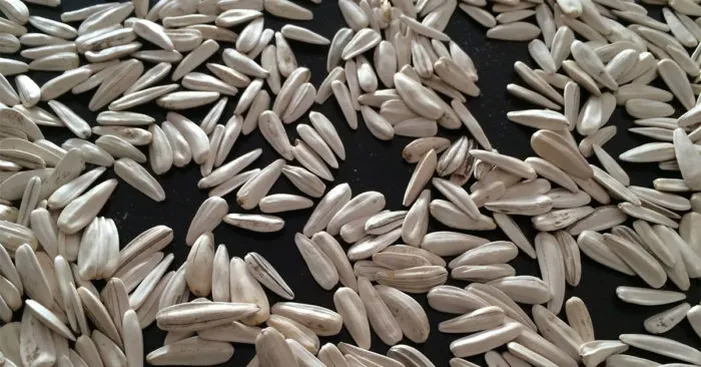
In spite of all the health benefits of white sunflowers, they can endanger your health.
You don’t have to worry though, because with moderate consumption there is nothing to be worried about.
However, in case of excessive consumption of sunflower seeds they can be:
Contaminated:
Most of the seeds and nuts can be a great host for harmful bacteria such as Salmonella. (15)
These bacteria thrive in moist and warm environments which can be easily avoided.
Because of that, you should definitely avoid consuming sunflower seeds directly from the plants.
Before consuming sunflower seeds you can expose them to high temperatures to kill the bacteria.
Filled with cadmium:
Cadmium is a mineral used in industries and should be treated as a dangerous chemical substance. (16)
However, some plants absorb this mineral from the soil including sunflower plants.
Once you consume sunflower seeds excessively, there are risks of high levels of cadmium contamination.
This mineral when it exists frequently in the body could lead to serious kidneys, liver, and even heart problems.
To avoid cadmium contamination, do not consume more than the recommended dose of 1oz mentioned above.
Blockage of the intestines:
Sunflower seeds can be very addictive and eating large quantities can cause you to accidentally eat their skin.
The skin of sunflower seeds cannot be digested and due to its tiny size, it can stick in the intestines walls.
Over time, an accumulation of small pieces of the skin of sunflower seeds can cause a blockage in the intestines. (17)
As a result, severe pain is caused by constipation which may need surgery to get rid of the blockage.
High in calories:
Now we all know that following a diet high in calories without burning them leads to gaining weight.
However, sometimes we forget that the calories we ingest are not only coming from the food we eat.
Small snacks like sunflower seeds, may seem too small to make a difference in the number of calories we consume per day.
This may be shocking news, but just 1oz of roasted sunflower seeds provides 165 calories.
Just to give you a better idea, that is more calories than a chicken wings (70 calories), beef (65 calories), and lamb (78 calories) for the same amount of 1 ounce.
High in sodium:
Some types of sunflower seeds are roasted with salt to add more flavor.
Added salt can cause high levels of sodium in the blood which raises its pressure and lead to cardiovascular disease. (18)
Allergic:
Compared to peanuts, sunflower seeds allergy is less common but some people do have it.
The people who deal with this type of allergy are mostly seed growers or bird breeders due to their constant exposure to seeds. (19)
The symptoms of a sunflower seed allergy can range from swelling of the mouth, rash, fever, and asthma.
If you are experiencing any of the above symptoms you should avoid consuming sunflower seeds.
Consuming white sunflowers seeds:
White sunflowers seeds can be found shelled or without a shell.
You may think it’s better to get unshelled ones, but most people enjoy taking off the shell of white sunflowers seeds with their teeth.
The sound of cracking the shell followed by the seed popping into your mouth with its nutty flavor hmmm irresistible!
To consume them as a snack, it is best to get white sunflowers seeds with their shells on.
It is because you would need more time to take off the shell and won’t end up finishing them quickly or filling your body with many calories.
On the other hand, peeled white sunflowers seeds are more versatile as they can be added to:
- Breakfast cereal.
- French fries.
- Fruits or yogurt.
- Tuna or chicken salad.
- Recipes instead of pine nuts.
- A vegan burger.
- Baked bread or cakes.
- Vegetable salad.
- Homemade granola. (20)
White sunflowers seeds combine well with both sweet and savory dishes, which makes it easy to enjoy their health virtues.
However, roasting or cooking these seeds may damage some of the nutrients especially the fatty acids.
That is why the best recommendation is to consume white sunflowers seeds raw, or add them unshelled and raw to your favorite dish.
Reminder:
In some cases, cooking white sunflowers seeds non-shelled may turn them green or blue.
Do not be afraid, that is a natural reaction between baking soda and the chlorogenic acid found in these seeds. (21)
How to store sunflowers seeds?
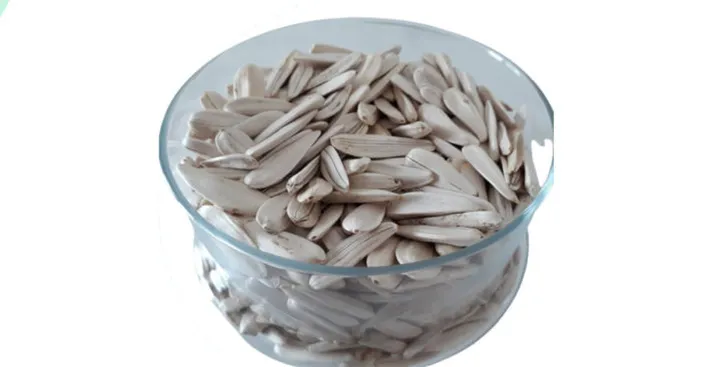
Again, this depends on the white sunflowers seeds you bought!
If you purchased:
Shelled white sunflowers seeds:
These seeds can be stored at room temperature, but it is recommended to store them in the refrigerator when it’s above 68°F (20°C) outside.
Unshelled white sunflowers seeds:
If you want to store the unshelled seeds, put them in an airtight container in the refrigerator.
References:
(1): Ranking Of Countries That Produce The Most Sunflower Seeds – Beef2Live | Eat Beef * Live Better
(2): Ranking Of States That Produce The Most Sunflowers – Beef2Live | Eat Beef * Live Better
(3): Why Sunflowers Always Face The Sun: Solved! (floraqueen.com)
(4): Sunflowers Really do Follow the Sun and 9 other Drazzling Facts (howstuffworks.com)
(5): Turkish Food – Sunflower Seeds (Ay Çekirdeği) • Turkey’s For Life (turkeysforlife.com)
(6): 9 amazing Sunflower seeds Nutrition facts and Health benefits (nutrition-and-you.com)
(7): Phytosterols and cholesterol metabolism – PubMed (nih.gov)
(8): Vitamin E & Immune System Support – BetterYou
(9): Vitamin E to Fortify the Immune System During Cold and Flu Season (pharmacytimes.com)
(10): The role of dietary fibers in regulating appetite, an overview of mechanisms and weight consequences – PubMed (nih.gov)
(11): Phytoestrogens: Benefits, risks, and food list (medicalnewstoday.com)
(12): Phosphorus in diet: MedlinePlus Medical Encyclopedia
(13): Selenium | The Nutrition Source | Harvard T.H. Chan School of Public Health
(14): Amazing Sunflower Seeds Benefits for Skin and Hair | Be Beautiful India
(15): Evaluating the Risk of Salmonellosis from Dry Roasted Sunflower Seeds – PubMed (nih.gov)
(16): High cadmium and nickel contents in sunflower kernels – PubMed (nih.gov)
(17): Fecal Impaction in the Rectum and Rectosigmoid Colon Secondary to Sunflower Seed Ingestion (hindawi.com)
(18): Blood Pressure UK
(19): Sunflower seed allergy – PMC (nih.gov)
(20): Simple Sunflower Seed Granola (cleaneatingmag.com)
(21): Chlorogenic Acid Oxidation and Its Reaction with Sunflower Proteins to Form Green-Colored Complexes – PubMed (nih.gov)

